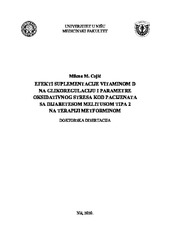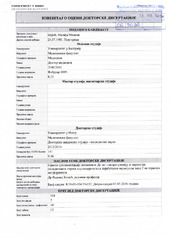Приказ основних података о дисертацији
Efekti suplementacije vitaminom D na glikoregulaciju i parametre oksidativnog stresa kod pacijenata sa dijabetesom melitusom tipa 2 na terapiji metforminom
| dc.contributor.advisor | Kocić, Radivoj | |
| dc.contributor.other | Antić, Slobodan | |
| dc.contributor.other | Pešić, Milica | |
| dc.contributor.other | Sokolović, Dušan | |
| dc.contributor.other | Lalić, Katarina | |
| dc.creator | Cojić, Milena M. | |
| dc.date.accessioned | 2021-06-25T13:57:56Z | |
| dc.date.available | 2021-06-25T13:57:56Z | |
| dc.date.issued | 2020-10-29 | |
| dc.identifier.uri | http://eteze.ni.ac.rs/application/showtheses?thesesId=8149 | |
| dc.identifier.uri | https://fedorani.ni.ac.rs/fedora/get/o:1700/bdef:Content/download | |
| dc.identifier.uri | http://vbs.rs/scripts/cobiss?command=DISPLAY&base=70052&RID=29760777 | |
| dc.identifier.uri | https://nardus.mpn.gov.rs/handle/123456789/18415 | |
| dc.description.abstract | In addition to the previously recognized role in bone metabolism, the scientific community is paying increasing attention to the non-skeletal effects of vitamin D. Research has shown that vitamin D deficiency can play an important role in glycemic control in patients with type 2 diabetes mellitus (T2DM) because it affects adequate insulin secretion, the occurrence of insulin resistance (IR) and systemic inflammation. Recent evidence suggests that vitamin D may protect cells from oxidative damage, thereby exhibiting an antioxidant effect. However, despite high expectations, intervention studies have failed to discover the exact place and role of vitamin D in the control of this chronic disease. This study was aimed to investigate the effects of six-month vitamin D supplementation on glycemic control, oxidative stress, and cardiovascular risk parameters in T2DM patients on metformin therapy. This 6-month follow-up study was carried out as a randomized, controlled trial of 130 patients with DMT2 recruited from Primary Health Care Center Podgorica (June-December 2018). All patients were randomly assigned into 2 groups (ratio 1: 1) where the first group received vitamin D and metformin, while the second group continued to take only metformin. Dosing was performed according to the Endocrine Society guidelines based on the participant’s initial levels of vitamin D. All subjects underwent clinical examination and detailed laboratory analyzes at 3rd and 6th month of the follow-up period. The potential benefit on glycemic control was monitored through determining the values of fasting glycaemia, glycosylated haemoglobin (HbA1c), fasting insulin level as well as through determining surrogate markers of IR (HOMA-IR and TYG index). The effect on oxidative stress parameters was monitored by determining activities of enzymes myeloperoxidase (MPO), xanthine oxidase (XO) and catalase, followed by determination of the nitrate and nitrite levels (NOx), total oxidative (TOC) and total reductive plasma capacity (TRC). The products of oxidative lipid damage were monitored by determining the concentration of malondialdehyde (MDA) and the TG - thiobarbituric acid reactive substances ratio (TG/TBARS). Oxidative protein damage was monitored through determination of the advanced oxidation protein products (AOPP). The effect on cardiovascular risk parameters was monitored by determining the values of systolic (SBP) and diastolic blood pressure (DBP), body mass index (BMI), waist circumference (WC), TG, total, HDL and LDL cholesterol, as well as atherogenic risk indexes Castelli I and Castelli II. The results from our study showed a favorable effect of vitamin D on fasting glycaemia over the 3-month follow-up period. After 6 months of supplementation, HbA1c levels were significantly lower in the vitamin D receiving group, but there was no statistically significant difference between the groups. Vitamin D also showed a favorable effect on IR measured by TYG index after 3 and after 6 months of supplementation, but there was no significant effect on the values of HOMA-IR index. During the follow-up period, there was no statistically significant difference between the groups regarding levels of lipid and protein oxidative damage products (MDA and AOPP), although patients receiving vitamin D tended to have decreased levels of MDA during the study. After 3 months, a significant effect on TG/TBARS index was observed in favor of patients receiving vitamin D. A favorable effect was observed on MPO levels after 3 and after 6 months of supplementation, while there was no significant effect on XO levels. The antioxidant plasma capacity, TOC and NOx levels did not change significantly under the influence of vitamin D supplementation. Most patients had hypertension and took BP lowering drugs regularly. Vitamin D did not lead to a significant decrease in SBP and DBP, although in the Metformin + Vitamin D group there was a statistically significant decrease in SBP values after 3 months. The favorable effect on lipid status was seen only for TG levels after 3 and after 6 months period. A significant anti-atherogenic effect was observed only regarding Castelli I risk index and only after 3 months of follow period. Oral vitamin D supplementation did not have a favorable effect on BMI and CRP values, but after 3 months it showed a favorable effect on WC values. Short-term vitamin D supplementation leads to a significant reduction in fasting glucose, TG/TBARS index and atherogenic risk index Castelli I in patients with DMT2 on metformin therapy. Long-term vitamin D supplementation leads to a significant decrease in MPO, TG and TYG indices, while the favorable effect on WC values is more an incidental finding than a reflection of the favorable effect of vitamin D. | en |
| dc.format | application/pdf | |
| dc.language | sr | |
| dc.publisher | Универзитет у Нишу, Медицински факултет | sr |
| dc.rights | openAccess | en |
| dc.rights.uri | https://creativecommons.org/licenses/by-nc-nd/4.0/ | |
| dc.source | Универзитет у Нишу | sr |
| dc.subject | vitamin D | sr |
| dc.subject | vitamin D | en |
| dc.subject | glycaemic control | en |
| dc.subject | oxidative stress | en |
| dc.subject | malondialdehyde | en |
| dc.subject | AOPP | en |
| dc.subject | myeloperoxidase | en |
| dc.subject | xanthine oxidase | en |
| dc.subject | NADPH-oxidase | en |
| dc.subject | antioxidant enzymes | en |
| dc.subject | cardiovascular risk | en |
| dc.subject | diabetes mellitus type 2 | en |
| dc.subject | glikemijska kontrola | sr |
| dc.subject | oksidativni stres | sr |
| dc.subject | malondialdehid | sr |
| dc.subject | AOPP | sr |
| dc.subject | mijeloperoksidaza | sr |
| dc.subject | ksantin oksidaza | sr |
| dc.subject | NADPH-oksidaza | sr |
| dc.subject | antioksidantni enzimi | sr |
| dc.subject | kardiovaskularni rizik | sr |
| dc.subject | dijabetes melitus tip 2 | sr |
| dc.title | Efekti suplementacije vitaminom D na glikoregulaciju i parametre oksidativnog stresa kod pacijenata sa dijabetesom melitusom tipa 2 na terapiji metforminom | sr |
| dc.type | doctoralThesis | en |
| dc.rights.license | BY-NC-ND | |
| dcterms.abstract | Коцић, Радивој; Соколовић, Душан; Лалић, Катарина; Aнтић, Слободан; Пешић, Милица; Цојић, Милена М.; Ефекти суплементације витамином Д на гликорегулацију и параметре оксидативног стреса код пацијената са дијабетесом мелитусом типа 2 на терапији метформином; Ефекти суплементације витамином Д на гликорегулацију и параметре оксидативног стреса код пацијената са дијабетесом мелитусом типа 2 на терапији метформином; | |
| dc.identifier.fulltext | https://nardus.mpn.gov.rs/bitstream/id/72198/Cojic_Milena_M.pdf | |
| dc.identifier.fulltext | https://nardus.mpn.gov.rs/bitstream/id/72197/Doctoral_thesis_29058.pdf | |
| dc.identifier.rcub | https://hdl.handle.net/21.15107/rcub_nardus_18415 |



